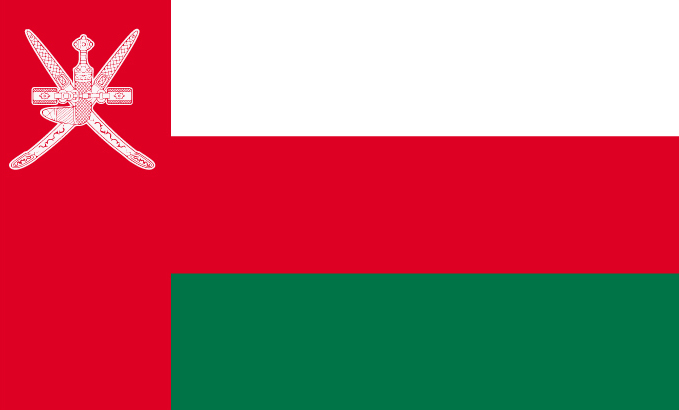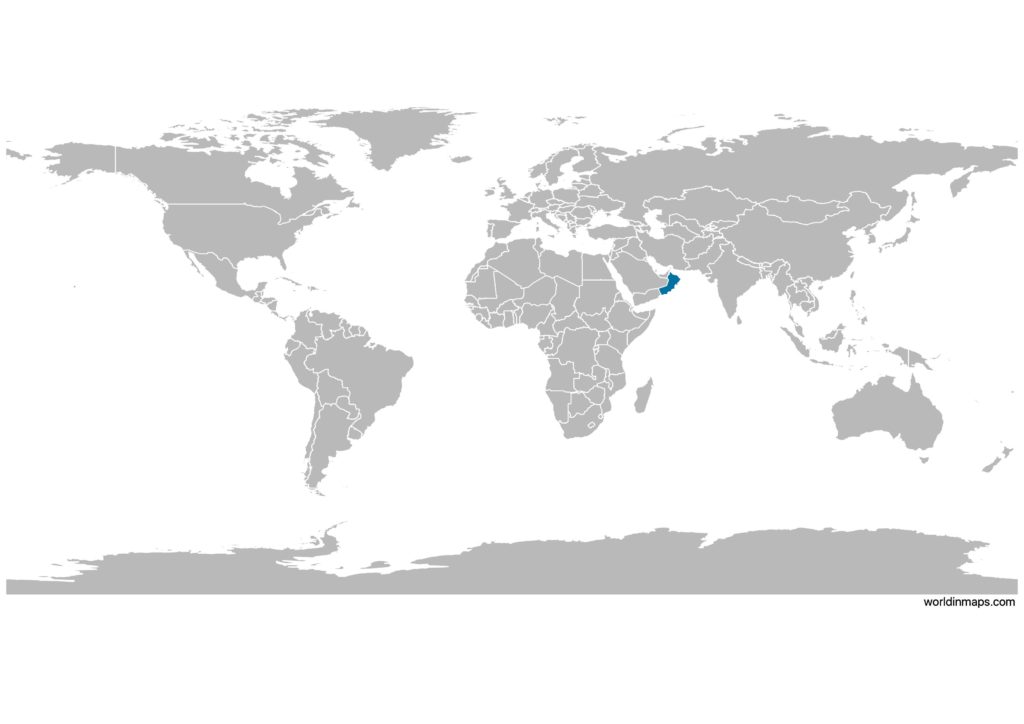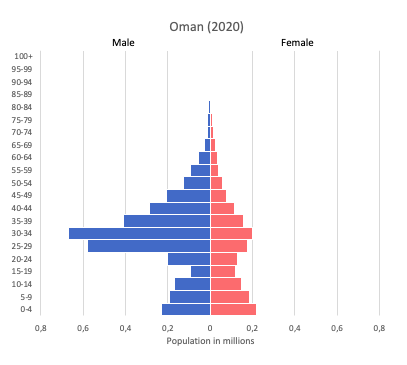Oman

| Government | |
| Name | Sultanate of Oman |
| Arabic | سلطنة عُمان Salṭanat ʻUmān |
| Government type | absolute monarchy |
| Capital | Muscat (797,000) |
| Currency | Rial (OMR) |
| People | |
| Population (2020) | 5,106,622 (125th) |
| Density of population | 15 P/km2 (177th) |
| Nationality | Omani |
| Official languages | |
| Arabic | |
| Ethnic groups | |
| Arab | |
| Baluchi | |
| South Asian (Indian, Pakistani, Sri Lankan, Bangladeshi) | |
| African | |
| Religions (2010) | |
| Muslim | 85.9% |
| Christian | 6.5% |
| Hindu | 5.5% |
| Buddhist | 0.8% |
| Jewish | <0.1% |
| other | 1% |
| unaffiliated | 0.2% |
| note: Omani citizens represent approximately 56.4% of the population and are overwhelming Muslim (Ibadhi and Sunni each constitute about 45% and Shia about 5%) Christians, Hindus, and Buddhists account for roughly 5% of Omani citizens | |
| Life expectancy (2020) | |
| Male | 74.4 years |
| Female | 78.4 years |
| Total population | 76.3 years (98th) |
| Homicides | |
| Total (2018) | 0.3 per 100,000 people (170th) |
| Geography | |
| Land area | 309,500 km2 |
| water area | 0 km2 |
| total area | 309,500 km2 (72nd) |
| Mean elevation | 310 m |
| Lowest point | |
| Arabian Sea | 0 m |
| Highest point | |
| Jabal Shams | 3,004 m |
| Land use (2011) | |
| Agricultural land | 4.7% |
| Arable land | 0.1% |
| Permanent crops | 0.1% |
| Permanent pasture | 4.5% |
| Forest | 0% |
| Other | 95.3% |
| Urbanization | |
| Urban population (2020) | 86.3% |
| Rate of urbanization | 5.25% annual rate of change (2015 – 2020) |
| Economy | |
| Labor force (2016) | 2.255 million (119th) |
| note: about 60% of the labor force is non-national | |
| Labor force by occupation | |
| Agriculture | 4.7% |
| Industry | 49.6% |
| Services | 45.7% |
| Unemployment rate | NA |
| GDP (PPP) (estimate 2018) | |
| Total | $203.959 billion (67th) |
| Per capita | $47,366 (23rd) |
| GDP (nominal) (estimate 2018) | |
| Total | $76.609 billion (66th) |
| Per capita | $17,791 (43rd) |
| GDP by sector (estimate 2017) | |
| Agriculture | 1.8% |
| Industry | 46.4% |
| Services | 51.8% |
| Exports (2017) | $103.3 billion (35th) |
| Exports partners (2017) | |
| China | 43.7% |
| UAE | 11% |
| South Korea | 7.9% |
| Saudi Arabia | 4.2% |
| Imports (2017) | $24.12 billion (70th) |
| Imports partners (2017) | |
| UAE | 35.5% |
| US | 27.8% |
| Brazil | 4% |
Oman on the world map

Oman is located in Asia and more specifically in the Middle East.
Oman top 10 largest cities
- Muscat (797,000)
- Seeb (237,816)
- Salalah (163,140)
- Bawshar (159,487)
- Sohar (108,274)
- Suwayq (107,143)
- Ibri (101,640)
- Saham (89,327)
- Barka (81,647)
- Rustaq (79,383)
Demography
Population pyramid

Age structure data
Estimate for 2020:
- 0-14 years: 30.15% (male 561,791/female 533,949)
- 15-24 years: 17.35% (male 331,000/female 299,516)
- 25-54 years: 44.81% (male 928,812/female 699,821)
- 55-64 years: 4.02% (male 77,558/female 68,427)
- 65 years and over: 3.68% (male 64,152/female 69,663)
Remark: the age structure of a population affects a nation’s key socioeconomic issues. Countries with young populations (high percentage under age 15) need to invest more in schools, while countries with older populations (high percentage ages 65 and over) need to invest more in the health sector. The age structure can also be used to help predict potential political issues. For example, the rapid growth of a young adult population unable to find employment can lead to unrest.
Population from 1950 to 2020
Source: United Nations, Department of Economic and Social Affairs, Population Division (2019). World Population Prospects 2019, Online Edition. Rev. 1.
Evolution of the life expectancy from 1960 to 2018
Source: World Development Indicators, The World Bank
Economy
Agriculture:
dates, limes, bananas, alfalfa, vegetables, camels, cattle, fish
Industries:
crude oil production and refining, natural and liquefied natural gas production, construction, cement, copper, steel, chemicals, optic fiber
Exports – commodities:
petroleum, reexports, fish, metals, textiles
Imports – commodities:
machinery and transport equipment, manufactured goods, food, livestock, lubricants
Time zone and current time in Oman
Go to our interactive map to get the current time in Oman